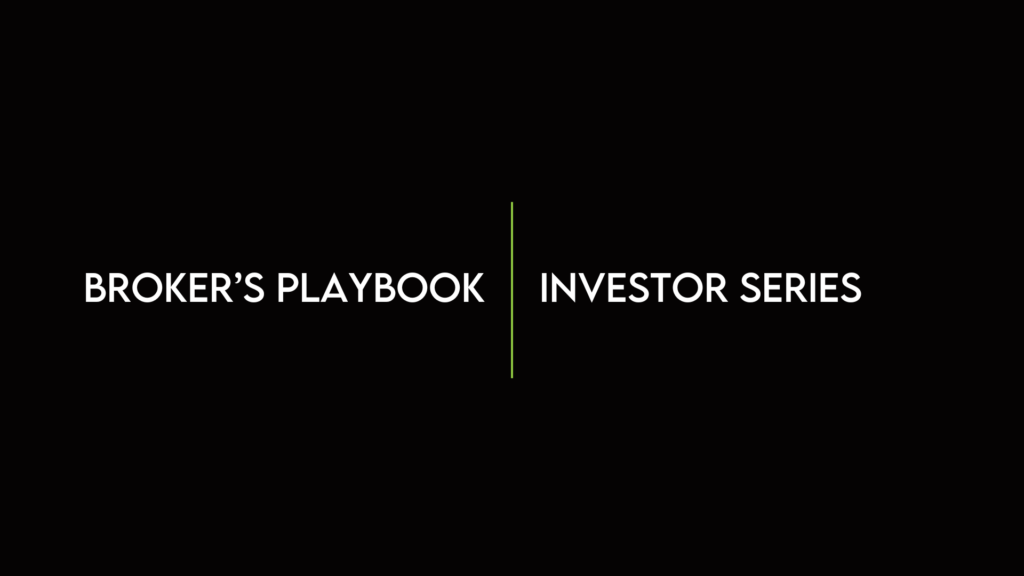
Making money and how to invest in real estate is a great way to create wealth and achieve financial freedom. Although it may not be a secret, it does require a level of understanding of how the market works.
In this special episode of the Investor’s Playbook Podcast, Josh Perez of Synergy Mortgage Group educates us on the ways he brings clarity to his clients, their real estate investments, and the significance of clarity on your money. Additionally, Perez highlights the importance of considering certain factors when investing in real estate, which can ultimately impact your ROI. So, if you’re ready to take control of your financial future, watch this video and arm yourself with the knowledge to make informed decisions about investing in real estate.
As an investor, understanding these investment types can be the key to your success. Welcome to the Investor’s Playbook Podcast!
Bobby Puim: Investors Playbook Fam. Welcome to another episode of the IP podcast. Today we’ve got Josh Perez, a super savvy mortgage broker out of the Hamilton, Ontario area, joining us to run you through what his playbook is and how to get you up and investing in a bigger, faster, better, stronger way. Josh, welcome to the show, my man.
Josh Perez: Hey, thanks, Bobby. Really appreciate it. It’s excited to be here and should be a lot of fun.
Bobby Puim: It’s I can’t wait. I’ve been waiting for this conversation for for a while now. And it’s because it’s because when we bring people on to the show itself, we like that they are also investors. You happen to be an investor yourself, right, my man?
Josh Perez: Absolutely. Yeah. I started started investing as was a funny kind of story, but started investing in 2010 was first purchase with, you know, a couple of buddies and kind of just all started with a couple of us, you know, working at banks. One was in construction, and we just decided that, you know, we wanted to start to plan for the future of kind of more so opening a business. And and we would meet every two weeks at one of our partners parents house and float a bunch of different business ideas and then eventually got onto the topic of real estate, started watching some HGTV, went to some real estate investment network conferences. We were looking at flipping. Then we pivoted to buying and holding and renting and looking at multi units. And then we started to once we locked into that that idea, an asset class, it I mean, I don’t want to say the rest was history, but like we started to, to kind of just focus in on that and we started by opening up like a joint savings account, like the three of us literally, and just started, you know, biweekly savings together for down payment. And, you know, back in 2010, a little bit of money went a lot further than right now, in fairness. But it all kind of started there. And really what allowed us to kind of continue to grow like I have a portfolio of 90 doors right now, but every property in the mix helped get to the next one in some way, shape or form, right? And the power of leverage, that’s one of the things I’m really excited to chat about. You know, most investors when they get into real estate, you know, understand that concept. But I think it often gets missed when people are assessing different places that they can invest in the stock market and mutual funds and GICs and real estate. The concept of leverage and the math sometimes doesn’t get calculated properly, which when people I’m sure like you guys and your audience understand the math when done correctly, is very, very powerful on the capital. You’re actually investing with real estate.
Bobby Puim: Absolutely. And we’ll definitely get to leverage and touching on that math because that’s your expertise that you’re going to bring a playbook for the investor’s playbook community today, Right? We’re going to talk leverage and math, but I want to take a step back. And you said 90. That’s nine zero for those of you that can’t see my hands up on the screen doing nine and a zero right now. So I have that number, correct? Right. 90 doors currently in the portfolio.
Josh Perez: 90 doors. Okay. Let’s say I’m at 7072 and when I actually close in May on an 18 unit, I’ll be at 90. So yeah, 70 to 90 in May. Yeah. Yeah.
Bobby Puim: Fair enough. Fair enough. But but where I want to be able to go with it is I think that a lot of people come to us searching for education about how to get to, to how to get to 3 or 4. And what I really want you to dive into here for us, my man, is, is this you mentioned that you only buy something when you know that it is going to contribute both ways. So to the ones that you have currently by adding to your portfolio but is going to allow you to push forward into the next one as well. Can you elaborate a little bit on that?
Josh Perez: Yeah, So so that’s a really good question. And you know, there are so many different ways that you can invest in real estate. There are so many different strategies, right? So I think what’s super important to determine with the help of, you know, your team, right, your power team and people that you look to for advice and education is really like asking the right questions about like, why do you want to do this? What are your your goals? You know, for most people, it’s, you know, it’s to be able to retire sooner or retire at all. Right? It’s to maybe help family in the future. It’s to maybe work toward paying towards their kids education. It might be for all kinds of different things in the future. You know, being able to supplement your income that you might have on day one, that might be a bit more challenging. It’s not impossible. But I think, you know, working toward building a bigger and bigger nest egg down the road is, you know, a lot of the the people that we help, I would say it kind of starts there. Why do we want to do this? Right? So if it’s like replacing your day job, like right now, there might be a much different strategy than the version of, Hey, I just want to have an extra $500,000 or $1 million to top up or $3 million. Whatever it is in retirement, because I have these three pensions that will add up to this.
Josh Perez: But then I want to do a bunch of traveling or I don’t have any pensions and I need to replace this income or I plan to take on this project at age 60 or 65, whatever the case may be. But so there’s different strategies based on what, you know, shorter or longer term goals, right? And then from there, you know, do you are you looking at buying one property and that’s going to contribute to X or are you looking at running scenarios on acquiring multiple properties, multiple properties, because more of them will help you get to your goal if it’s maybe larger? And so as a result, a lot of people don’t have infinite capital to keep putting towards down payments and maybe renovations. If you’re looking at improving a property a little bit more rapidly or forced appreciation. And so, you know, you might have some capital saved or working towards saving for say, like the most common entry point is down payment. Let’s just say, okay, or maybe you don’t, but maybe you have a primary residence or other property that you can access equity in or borrow so that that could be in the form of increasing the amount you owe on that house by increasing your mortgage or setting up a home equity line of credit like those are typically two of the I mean, savings, you know, not a lot of people can save their way to a 20% down payment on a rental property.
Josh Perez: Some have and some are doing it. But a lot of people have gotten involved in investing in real estate and really scaling by leveraging equity they have in other property. And it’s got to make sense. And again, it’s not all about, you know, the person needing to run all the math to see if it makes sense and if I increase my mortgage by 100 or 200,000 and now I have an extra 600 or 800 or $1,000 payment, like, does that make sense by buying this? Like that’s where like aligning yourself or leaning on people that have resources in real estate investment is super important because that’s like what my day job is, is kind of building out all those scenarios for you. Like, all I really want to know is like, what are your goals? Understand a bit about your financial picture. Try to maybe even like unlock some of the things that a lot of people don’t think are possible and say, hey, like, you know what? Guess what? Like we have like dozens of people who are doing this exact thing. This is how they they did it. And it might be like, hey, yeah, you know what? I I’m not really into this whole renovation thing. Like, I don’t I’ll get too much anxiety. I don’t want to manage people. Maybe it’s best that I team up or maybe partner with someone else or I’m willing to, you know, meet some people.
Josh Perez: And hey, if you’re willing to share some of your contacts, I’ll do all the interviews and I can go and meet people and learn and take a bit of risk in that realm. And that works for me too. Right? So, you know, we talked about, okay, like, you know, what are our goals, right? How many properties, what kind of investment strategy do you have capital available or not? Can you access it through other property? Do you have it in savings or investments? Do you have other people in the mix that might share your goals? Right. Because the other thing could be people, right? It could be family, it could be friends, it could be colleagues. Right. You could kind of tag team certain things. Right. A lot of people do it that way. A lot of people may be capable of buying 1 or 2 properties on their own, and then eventually they might get tapped out of capital or time or qualifying. And then people in their circles start to notice, hey, like, you know, Bobby’s been kind of busy with this real estate thing and he’s posting all these crazy things. He’s showing us renovations, gutted property. I just know Bobby from work or I know Bobby from, you know, Thanksgiving or seeing him a few times a year. I should talk to this guy. How is he doing it? Like, you know, stuff like that. Of course.
Bobby Puim: I would be at Thanksgiving making sure that everything was eaten. That would be perfect. But what it sounds very much is, Josh, it feels very much as though what you’re saying is that it all starts with one, like it all starts with your why, it doesn’t matter. 72 moving to 90. It doesn’t matter. 30 or so for me, right? I know people with ten. I know people with 150, but it starts with one, right? And it really does just back it up a little bit to starting with your why and figuring out what that that power team is going to do with and for you, am I right, my man?
Josh Perez: 100%. The education that I think you would agree with that first property or project like if we’re just saying we’re not talking about like your primary residence for example. Right. Your first investment property or experience with that like is just like tends to often open the floodgates of confidence, your risk appetite, your skill set, just unlocking the doors of different relationships and people and resources that can help you. It’s just getting over that first one because you know, you can talk about it in theory. You could hear examples, you could speak to other people. But when you’re managing your own balance sheet and the income and expenses and you’re like the person, the quarterback, that everything is coming to the decision maker in a lot of ways that’s. That’s where you’re going to learn the most, right? And when things don’t go according to plan, which like, you know, that’s where like operating with outcome, a range of outcomes and contingencies, right? It’s like something’s going to come up, whether it’s, you know, time going longer, maybe an unforeseen that you couldn’t have catch, couldn’t have caught, you know, during an inspection or a walkthrough. Right. You know, or did you build in contingency for an extra five, ten, 20 grand? Is that going to drown you? Hopefully not.
Josh Perez: And that should, you know, certain things should be built into the whole project cost. And so just it just prepares you for next time to be looking a little bit more closely at certain things that maybe you missed originally, but you have so much more confidence and then just that belief that you can go into a project and we’re talking about projects like just in this example of like properties that you can add value to. So like forced depreciation, right? So if I put in a dollar toward kitchen bathroom flooring, you know, generally maybe that returns me 2 to $3 in value, right? Versus, you know, some people. Yeah. Some people, you know, may have capital. Right? And maybe it’s sitting in savings or in bonds or in GICs or mutual funds and stocks, and maybe they want to diversify that. Maybe they’re not happy with that and maybe they have all the down payment and renovation, but maybe they’re just looking for capital preservation, right? So for me, like like my personal goals and most of my clients that we work with, they’re looking to grow their capital, right? They’re not necessarily looking at like, set it and forget it.
Josh Perez: Hey, I’m going to buy this duplex, I’m going to buy this ten unit apartment building, and I’m not really looking to put much money into it. I just want to park my money and generate. Ten, 15, 20% on it when you factor in mortgage paydown appreciation. Cash flow, those kinds of things. Most of the people are like, hey, I got 100, 200, 300 K that I can access between, you know, savings, borrowed equity, family partner, I can put it, put it into a project for a year, a couple of years. But I got to get that back and then I want to stabilize an asset, get it to a point where I can pull money out, refinance it. It’s cash flowing, so the income on the property can service that new enlarged debt, get that money back. If it all went well and the numbers are looking good, rinse and repeat. And that’s kind of typically the model that we try to work toward. It’s not it’s not easy. There’s not opportunities readily available. The cost of borrowing has gone up a lot. I mean, when when interest rates were one and a half and two and 2.5%, like.
Bobby Puim: Everybody all day long, is borrowing to be able to do that exact thing. It’s also, unfortunately, the people that only ran their numbers at that 1 or 2% rate for their proformas to ensure that they’d be cash flow positive years down the line and didn’t use a more conservative number like 3 or 4% that now find themselves with their pants down as the tide goes out.
Josh Perez: Absolutely. And I think, yeah, it’s about kind of contingencies, I think, in real estate. And you guys, you know, you’re your experts more on the day to day data and transactions and seeing things. I see things as an investor. I’m paying attention to it and through clients, but I don’t see, you know, sales day by day. Right. And what what’s going on regularly with pricing. But I mean, you know, people who got into real estate investing and you know, in 2020 and you know one of the cardinal rules, you know, is cash flow, right? Cash flow on a property. So like, you know, the rental income being exceeding the expenses you have on a property, right. Like allows you to carry and hang on to that property like indefinitely. It’s not burning a hole in your pocket. But when people are like, you know, speculating on just the market going up and up and up and not being worried about the cash flow position because, you know, in three months or in six months, I’ll sell or I’ll refi or I’ll do this. And it’s contingent on a growing value no matter what. That’s where, you know, we’ve seen some challenges where maybe values didn’t go up and up and up, even if houses were improved. But also the costs of borrowing moved from, you know, two and 3% to like five and 6% with conventional lending. You know, if you had to find yourself in in some alternative lending and it could be higher than that. So but the reality is, like investors haven’t really stopped. It’s been harder. It’s been a bit more selective. I’m sure you know, the investors that you guys are working with, did they just stop in the last year and say, I’m done investing or it’s just maybe you got to you got to look at maybe twice or three times the amount of properties and underwrite a few more of them to assess if the numbers can make sense.
Bobby Puim: I think that you’ve nailed that, to be honest with you. It’s the savvy investor understands that now is a ripe time to be going and acquiring things. Interest rates, we don’t believe, at least we don’t have a crystal ball. So maybe we shouldn’t speak to it, but we don’t believe that they’re going to be this high forever. Right. That’s actually more of your wheelhouse. So tell me a little bit about where you see interest rates going over the next call it two, two years, 24 months here in Canada. Yeah.
Josh Perez: So if I look back at the last two years and where I thought things were going to go in the roller coaster region, it’s could not have predicted this. But what I would say is, you know, in about the last fall, you know, what I was really eagerly looking forward to was the point in time where it was almost a consensus amongst the media, economists, analysts, experts, whoever we want to call them, that we were pretty much at the finish line of rate increases. Right. And that kind of just came, you know, a couple of months ago where it’s like, okay, maybe there’s another quarter point increase or maybe we’re done. It kind of seeming like we’re close to the finish line. At least no one’s really arguing that a whole lot right now. It’s not to say it’s not possible. So from that point in time, I was just really curious to see what was going to happen with demand and real estate, because, you know, we’re pre-approving clients. We have clients regularly, like the goal and milestone of home ownership or building wealth through real estate by investing like we’re not seeing conversations of that nature slow down in any way. They’re only going up and in the cost, like with the price of like with with inflation rising, like it only furthers the need to grow your nest egg. Right. And look out for your financial future.
Josh Perez: So it might be harder, but I think people are a lot more conscious of the need to supplement the regular income because incomes are not have not been growing at the pace of the cost of a head of lettuce and eggs and all the funny, you know, kind of items we can pick out right. But so going back to your question about where rates are going, I mean, so so we got to this point where it’s like, okay, we’re kind of at the tail end. Then we saw something happen a short while ago in the US where a major bank, I think it was 16th largest in the US, collapsed for a few different reasons and got bailed out. And then that had a trickle down effect too. You know, there’s the Bank of Canada and the prime lending rate, which is tied to variable rate mortgages. And then there’s the bond market that’s tied to fixed rates. They don’t move in the same direction necessarily. And so the the banking collapse of a Silicon Valley bank impacted the bond market initially. Right. And so since that happened, we’ve seen fixed rates come down a little bit. So if, you know, majority of lenders for conventional money were in like, say, the mid fives, you know, now they’re in like the low fives and we’ve got a few lenders that are, you know, a little bit more aggressive and they’re in like the high fours.
Josh Perez: Okay. Variable rates have not changed. The signal from the Bank of Canada is like in what I thought was going to happen prior to this Silicone Valley Bank thing was that we probably weren’t going to see, you know, maybe we see an increase of a quarter or 0.5 at some point. It was kind of like a toss up. It’s clear that all these decisions are being made by the most recent inflationary report and data, right? So it’s like, okay, we were at, you know, in December, I think we were at like low 8%. Then in the early New year, we got down to like 6.2 and then we got down just a week or two ago to like low fives. Great. It’s moving in the right direction. We’re still two and a half times higher than where it needs to be inflation, right? So if it keeps trending downward, that’s great. But if something changes in like next month’s report, we’re flat or we’re slightly higher. They might reverse course. Like that’s what everything really comes down to right now. However, if there’s some more kind of systemic issues with banks collapsing and a trickle down effect, well, that’s a bit of a wild card, right? And so that bank, you know, needing to be bailed out in the US, a big one. And then a couple other ones as well, like that’s actually put downward pressure on rates.
Josh Perez: You know, a couple articles in the past week saying, oh, there might be some rate cuts in Canada sooner. But again, going Google over the last two years, any end of the spectrum of where rates are going and you’ll find your answer. Right? You know, I think right now fixed rates, I think will continue to trend downward very slowly over the next few months. I don’t know that unanimously, if we go to every big bank or mortgage company or credit union, if they’re all going to hit the high fours by the end of summer, I don’t know. I think definitely we’ll have some options staying in that high four range for the next few months, I think. And Bank of Canada, I don’t really see them doing anything like on the downward until maybe maybe Q three at the earliest. But I can’t be wrong. So if I’m running my numbers on any kind of properties I like, I’m probably not building in too much of a rate premium or increase over the next little while. Maybe I’ll build in quarter 50, 50 basis points maybe, but I don’t even know that that’s really necessary. I think if anything, you might, you might get a bit of a better rate if you’re buying something in the next 3 to 6 months.
Bobby Puim: And that’s sort of the moral of the story, is that I see it very much the same way. I believe that things are stabilizing to a degree. I think that it could go up a little. It could go down a little. It depends on what metric you’re using. But it no matter what and I’ve always I’ve always adhered to this tenet that a mortgage, especially for an investment, is simply a tool in your tool belt. Right? Correct me here where I’m wrong, Josh, but I believe that if if you’re running your numbers properly and you’ve got a power team utilizing somebody such as yourself when it comes to this type of thing, it’s very, very simple to bump up, bump down and understand exactly where you should be when it comes time to then talk. The whole point of our conversation leverage and the math that goes behind it. So maybe it’s the perfect segway into why then why are people using real estate at a greater rate than normal to build wealth? You’ve mentioned a couple of things. I’m going to try to guide it a little bit here. But your primary residence, not an investment, we agree, correct?
Josh Perez: Yeah, I would say it’s it ends up it can end up being an investment that produces wealth for you. But intentionally, if you’re say you had your down payment money, if you line up and run the numbers and prospects on duplex single family apartment building, primary residence, yeah, it would lose probably every single time when done if you’re effectively trying to work each property type. But does it end up being a wealth builder for Canadians? It has been like, you know, kind of been an almost time tested in a lot of ways. But yeah, strategically I would say no.
Bobby Puim: And it’s that strategy, right? When we’re using leverage, specifically the math, the leverage point of the single family home that you currently use as your primary residence to move off into that one, that’s going to become the tipping point for more and more. So walk us through how you’re helping people access that level of equity for themselves and what it does for them on the flip side of that equation.
Josh Perez: Yeah, absolutely. So, you know, for for those who aren’t able to, which is most people, you know, saving their way to a down payment, I’ll just use some what I hope is kind of like relatable math, right? So what I’ll say is, you know, buying a rental property in Canada generally, the rule is that you have to put 20% down. If it’s a residential property, four units or less, if you’re living in the property in one of those units, okay, there’s a program or you can put less, but let’s just say 20% down, you’re not going to be moving into it. Right? So quick math, $500,000 house, $100,000 down payment.
Bobby Puim:
Josh Perez: $700,000 property. $140,000 down payment. Okay. So you know the version of borrowing to invest. And it’s not to say that it’s, you know, a perfect strategy for everyone or a perfect strategy for every investment type. But it is a mechanism to come up with a large amount of capital to get you into an investment class that you know, what can help accelerate building your wealth. And the reason why I think it’s it’s the avenue to accelerate building wealth for Canadians and homeowners is just the concept of what I just said. You know, if you have $100,000 in capital, whether it’s borrowed or savings, you can buy a $500,000 asset in real estate. You have $100,000 in capital. Generally, you can only buy $100,000 worth of bonds, GICs, mutual funds and stocks, generally speaking. Right. Stocks.
Bobby Puim: Exactly.
Josh Perez: Exactly right. And so the other part of it is and actually, I’ll stick with that for a second, right. So why that’s super important is in real estate, you know, you put $100,000 into a $500,000 house and I’m using that. Maybe we can’t buy $500,000 houses. And in some markets you can, some you can’t. But I just want the $100,000 example to just kind of be like easy to kind of run, right? So if that house goes up 5% in value. Okay. That’s. At $500,000 rose 5% in value, $25,000. Wright House is now worth $525,000. You put in $100,000. 25%. On your $100,000 stock market, your $100,000 goes up 5%, $5,000. You need 25% rate of return in the stock market to equal that same return in that example. You know, historically, you know, I came from a bank that was partly how I got exposed to credit and real estate as well as investing. And I was kind of a jack of all trades there, you know, helping people with retirement planning, mutual funds, credit, all these things. And, you know, always at the bank investment planners, they refer to the index chart, you know, which is kind of showing stocks, GICs bonds over like a 25 or 40 year period how they performed. And, you know, usually I think the target when I was there, which was a while ago, was, you know, in that 8 to 9% over a 25 year period is considered to be like a really good rate of return with a general basket of stocks or S&P 500 over that time period.
Josh Perez: So that was like the 25 years preceding me being there in like 2009 or maybe 2012. Okay. So 8 to 9%, like 5% appreciation in real estate. I don’t want to get into speculating his real estate going to go there in five years, but if you took 20, a 25 year period or a ten year period like is 5% crazy, if we’re building a plan off of that, should we use 3%? Like do you think 5% is like irresponsible? If we’re looking at ten and 20 year periods, like, I don’t know, I just think like that that’s one piece that I would equate it to. So the leverage piece, right, where your $100,000 goes like you’re at an advantage because you can buy assets that are worth way more. The other two big things are cash flow and principal pay down. So let’s start with principal pay down. What does that mean? That has to do with the concept of if you’re buying a property that you’re going to rent out. Okay. Obviously we just said you have $100,000, you’re buying a $500,000 house, you have a $400,000 mortgage or debt, right.
Josh Perez: As that debt gets paid down, you own more equity in that house, right? So if you have someone renting or a couple of people or 4 or 5 units of of rental income coming to you, that’s helping you pay for all the expenses of the property along with the debt that you owe. And there’s a surplus and you don’t owe money every month at the end, at the end of the month, after collecting the rental income, well, guess what? You have someone paying down your debt for you. And there’s a very easy calculation. You can run on that. So if you run, you know, at the end of the year, you know, so say just fast forward, we bought that $500,000 house and we started with a $400,000 mortgage. Like let’s just look one year from now that mortgage is now owing. Let’s just call it 400. Sorry, we got 390,000. Let’s just say as an example, right. That’s $10,000 of debt that was paid down, not by, you, $10,000 of newfound equity divided by your 100,000 investment boom. That’s another 10%. Greater return, that 10%, is that not maybe comparable to what we’re trying to achieve in the stock market on a regular period of time?
Bobby Puim: So it absolutely is. And and, Josh, you’re not worried about what the market is doing at that particular point. It’s simply it’s simply buying to hold in this particular instance, correct?
Josh Perez: Absolutely. Because you don’t like I mean, there’s all kinds of different factors. But generally speaking, if your income on the property is covering all the expenses, there’s absolutely no need to do anything with that property. Usually the only concern really is if a bigger opportunity comes up where you want to take that equity out. You could refinance or maybe you just want to unlock all of it and move on. There’s other stuff like managing the property and property managers, but that’s all kind of factored into the numbers as well. Just like a mutual fund is managed at two and one half percent, 2%, whatever, by a fund manager. There’s property managers in real estate. Like we always got to make sure I find to compare apples to apples versus like surface level conversations about real estate investing because it’s very mainstream and, you know, articles generally just lean on, you know, oh, we’re in a bubble. We’re not in a bubble. You know, prices are doing this, prices do that. There’s like 3 or 4 other underlying components of the numbers and the math that contribute to very significant rates of return over and above the appreciation, right? The other one was cash flow, right? So again, not going to pretend that these opportunities exist. If we pull up realtor.ca and we can just go and grab 30 of them right now just by looking around. But people are doing them every single week. We have clients that are purchasing investment properties and the math is making sense and I’m sure you guys do too. It’s actually happening. And and just with that mortgage paydown example, yeah. When interest rates are higher, your principal pay down is not going to be as high as when interest rates are 1 or 2 or 3%.
Josh Perez: But regardless, it’s a form of a rate of return on your money. So, you know, when interest rates are around, you know, two and 3%, that principal paydown was was closer to like between 9 and 11% per year on your 20% down payment. Right now, depending on what lender you go to, it’s probably closer to like 3 or 4%. Okay. And then the last part is like every month that your income exceeds all of your expenses, if it’s $500 a month, $1,000 a month in cash flow, $200 a month in cash flow again. So take. $500 a month in cash flow times 12 months, $6,000. That’s 6%. Another 6% to add in the mix onto your 100,000 investment. So you have three different components right there that, you know, don’t always work in your favor. But the beauty is that you coupled them. You can control some, you cannot, right? So you can buy a property and assess what the cash flow is going to be and be pretty bang on for that If it’s not rented yet or you need to renovate it, you can look at a few different versions of a mortgage amortization schedule with your partner and see what your pay down is going to be. You just you don’t know what the appreciation necessarily is going to be. But working with experts and you’re looking at comparable sales for property, understanding the area, looking at data with you guys, you can make good buys. And I would argue that any buy that has a path towards generating monthly cash flow is a good buy in my books because it allows you to weather any storm to realize those nice appreciation swings over time, which really moves the needle.
Josh Perez: If you don’t have cash flow and you have to fork up a few hundred dollars, $1,000 a month every month to just keep things afloat, that’s not generally a sustainable model unless it’s part of your like initial like reserve fund from day one. But usually those are limited, right? So that’s not usually the path to hanging on. And so, you know, all of those mechanisms. And then the last one is if you’re looking at properties, I think we talked about it earlier where they’re like value add or they’re distressed and you want to renovate them. You know, generally, again, I was saying, you know, for every dollar spent toward, you know, flooring, kitchen, adding units, things like that, the value you increase, you know, when buying correctly and looking at the right price points with your realtor, partner and appraiser. Right. That’s sometimes we loop in should generate more than the money you put in for the renovation. Right? So that’s like a fourth, fourth kind of pillar of, of where you make your rate of return, which for me, those four items, what it tells me and what I think is super important is like control. I did a video about this a little while ago. It’s like, why is real estate like everyone’s so obsessed part part of kind of like what your question was, is like leverage and control, right? What can you do to a stock to add value to it? Like nothing zero.
Bobby Puim: But can continue to buy iPhones, I suppose, Right? That’s the only thing.
Josh Perez: Yeah. Yeah, exactly. But like, you know, with, with a property, there’s so many different things that you can, you can do with it. You can add units, you can renovate it, you can improve it, you can build a secondary dwelling unit, you can change its use from single family to multi unit. There are just so many you could short term rent it. There’s arbitrage right now that’s very popular and there’s demand for. So there’s just all kinds of different things that you can do that can help you generate a rate of return, but also just protect. The downside I think is the main thing. That’s why I say I think real estate is the safest asset class that you can get into. Of course, you can cherry pick examples of things that go absolutely wrong in any investment, but when working with experts and when done correctly, there’s no question to me it’s the safest asset class that you can get into because of those two things leverage and control.
Bobby Puim: It’s again, so well said. Josh So so listen, we’ve been at it for a little while now. I want to make sure that the IP listenership walks away with a playbook from Josh. I need 1 to 5 things here that any investor could go out into the marketplace and utilize today as per Josh Perez. Give us three, 4 or 5 things, whatever it is. Okay.
Josh Perez: Um, number one, establish a power team. Okay. So I think your power team like the two main people right away if you decide, hey, I want to look into investing in real estate. Real estate agent. In a mortgage professional. Okay. The third one, that’s a close second or third or whatever, would be a contractor. Okay. Depending on if you’re going to pursue a strategy that involves renovating, I think those are your three most important people that okay, you may have some people in your circle, so go out and interview them. If you don’t, sometimes people get concerned with not having the connections. Lean on people that you do know and ask for introductions. That’s how, like the beauty of real estate investing is. The community is actually very, very open and transparent. And so lean on someone that, you know, that may have experience, may have experience with it. Reach out to your previous real estate agent that you might know and ask for connections to people who have experience investing in real estate and working with the type of project you might want to get into. Power Team Super important. Number two. Start before you’re ready. This is something we talk about in mortgages, specifically whether you’re trying to buy a home or invest in a property.
Josh Perez: People, not everyone, but a lot of people want to wait until a point in time where they think they’re ready before actually reaching out to to let’s say, if you want to call it experts or their power team to help them with a plan where they’re hoping at that point of when they deem themselves ready, that they can go and pull the trigger within a couple of months. But after they speak to the real estate agent, the contractor, the mortgage professional, they might receive some information or education that actually there were a couple of things that they weren’t aware of. And now it’s going to set them back 6 to 12 months for what they want to achieve. And it’s no one’s fault because like, we’re not taught in our existing school system very much about financial literacy, about real estate, about credit, about investing. So there’s no one to blame for that except for the climate and conditions that were educated on, generally speaking. Right? So starting before you’re ready, if you if you’re like I talk about setting up your power team interview, have conversations with people, even if you’re like, I don’t have any money in my bank account, but I know I want to invest or I need to invest for my family and I’m going to work on this plan.
Josh Perez: I have a couple of different ideas of how I’m going to source some capital, but it’s probably not going to come together for another 12 to 18 months. Listen, like, you know, for me and for you guys, I’m going to say something that’s a little bit out there. But like, listen, as a mortgage broker, I only we only get compensated when someone actually purchases a home and gets a mortgage. But listen, man, I’m here for the education piece and help you build a plan. And I want to speak to people 12, 18 months in advance and help. Put together a plan that’s in line with your goals. Right? So starting before you’re ready is is so important. It’s people actually are closer to what their goal is than they actually think. A lot of the times. And there’s so many things that you can that you might miss or not otherwise know that can accelerate you pulling the trigger on something that’s really important for you and your family. So power team, starting before you’re ready with with conversations. And honestly, it’s not super exciting or sexy, but. I think if people stuck with those two things, they can get plans off the ground really quickly after that.
Josh Perez: It really just comes down to the person and their individual goals and resources. Right? To say, okay, you know what, this is the best way to save or come up with your capital. Hey, you should chat with these people in your database or we should pursue this kind of property in London, Ontario or Mississauga or Toronto, or you should purchase a four unit or a two unit or a or a 20 unit apartment building. All that stuff really has to be tailored to the person and their financial picture and what their appetite is for the investment strategy, right? So all those things we can talk about, we can talk about buying properties that you can target that have better value add potential so that you can go and refinance sooner, pull capital out. So the Boro strategy, buy, renovate, rent, refinance. Yeah. If you don’t have an unlimited source of capital. One strategy I would recommend if this is my third playbook pointer is let’s look at opportunities where you can add value to a property and increase your chances. At pulling capital. Back out. And allowing you to scale and grow and keep building your net worth. Those would be kind of I guess I said two and three. Those would be my big ones.
Bobby Puim: It’s so good. It’s so good. Josh So build a power team, right? That’s Take it away. Start before you’re ready and make sure that you’re always adding value. If we were going to leave the Investor’s Playbook community with anything today, those are the three things. So. Okay, my man, thank you so much for joining us. I love your expertise. I love your insight into these things. We’re going to have more and more conversations and we’re going to see you featured more on Yp.com investor’s playbook.com. So Josh, thank you. From the community to you my man you’ve been wonderful and thank you for your playbook. We can’t wait to do this again.
Josh Perez: Thanks so much, Bobby. It was a lot of fun. I really appreciate your time and having me and excited to stay connected and ultimately just helping more Canadians build wealth through real estate. That’s what it’s really all about.
Bobby Puim: Love it. Thanks so much, Josh, We’ll see everybody soon. Thanks, guys.








